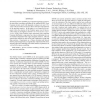117 search results - page 2 / 24 » A Structural Framework for Assembly Modeling and Recognition |
CVPR
2007
IEEE
14 years 7 months ago
2007
IEEE
Today's category-level object recognition systems largely focus on fronto-parallel views of objects with characteristic texture patterns. To overcome these limitations, we pr...
ICMCS
2007
IEEE
13 years 11 months ago
2007
IEEE
This paper introduces the software framework MMER Lab which allows an effective assembly of modular signal processing systems optimized for memory efficiency and performance. Our...
SOCO
2009
Springer
13 years 11 months ago
2009
Springer
Model composition helps designers managing complexities by modeling different system views separately, and later compose them into an integrated model. In the past years, researche...
ICASSP
2011
IEEE
12 years 8 months ago
2011
IEEE
Structured precision modelling is an important approach to improve the intra-frame correlation modelling of the standard HMM, where Gaussian mixture model with diagonal covariance...
ECCV
2010
Springer
13 years 8 months ago
2010
Springer
Abstract. Much recent research in human activity recognition has focused on the problem of recognizing simple repetitive (walking, running, waving) and punctual actions (sitting up...

